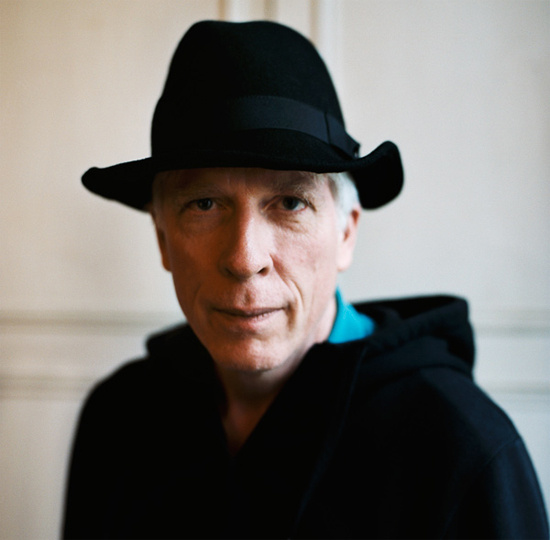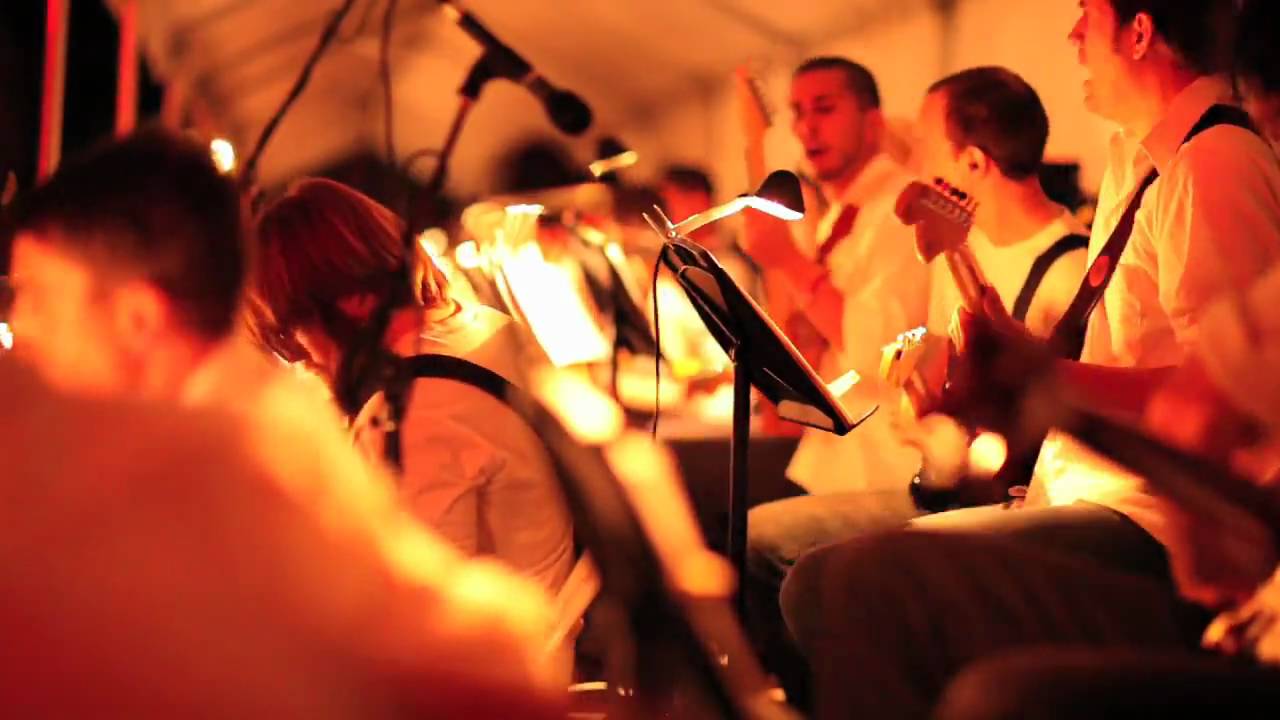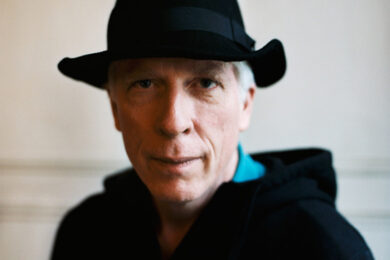Conducting an interview in an empty theatre is a bizarre experience. Rhys Chatham is in town performing one of his signature pieces, Guitar Trio and he’s just finished a Q&A with one of the curators in the ICA’s makeshift auditorium on the ground level. We only have about a half hour to talk before the gig starts in the other room, so we decide to do the interview on the stage in the same chairs, but sans audience, which means that all of my clunkier questions seem to have added echo, like we’re on some kind of failed chat show before the canned laughter is added. But Chatham is a perfectly charming conversationalist despite the surreal circumstances; he has searching but friendly eyes and a helmet of thick silver hair, no longer sporting the mullet you often see on his 90s press shots.
At the time of this interview, Chatham was riding the crest of some very high profile performances, especially A Crimson Grail (a composition for 200 guitars) at the Sacré Cœur in his adopted city of Paris and at the Lincoln Center in his home town of New York. With the amount of no wave inspired bands, and Soul Jazz compilations popping up in the late noughties, there was a resurgence of interest in his early work as their continues to be today. This interview is of course a product of 2009, a certain exasperation with the noughties Brooklyn scene and the reference-heavy hipster bands, which in certain circles has started to give way to more direct and intense sonic explorations from, ironically enough, the no wave old guard like Swans and even techno-based artists like Raime and Emptyset, which Chatham’s work certainly relates to.
Chatham’s work in the late seventies/early eighties started at the tail end of minimalism (Reich, La Monte Young, etc) but as he tells me, "it wasn’t until the no wave people came up that I felt like I was part of a tribe, this is my scene". After famously witnessing a Ramones gig he started incorporating the guitar into his compositions and punk artists (from Ut and Sonic Youth) into his ensembles. Journalists often talk of the distinction between high culture Soho bands and punkier East Village acts, but Chatham insists this was not the case.
Like Glenn Branca, who came to occupy a similar musical territory, but entering from the punk side via Theoretical Girls, Chatham explored the use of overtones produced through alternate-tuned guitars playing in unison. Yet despite the music theory and the technical background, Chatham seems to revel in sound as a kind of sublime and communal experience, which is fundamentally about the performance itself and can’t be laid down in notation. It was this immediacy which I was curious to talk to him about.
You talked in the Q&A earlier about sleep and drone metal, have you had the pleasure of seeing Sunn O))) recently?
Rhys Chatham: I’m friends with Steve [O’Malley], he lives in Paris, but surprisingly I’ve never heard them perform live and I can’t wait! A friend of mine produces a festival which they performed at and he said that it was so loud that the bartenders got sick – and he was saying that in a positive way! I have seen Steve perform with a group, I believe they’re called KTL, and we saw it in this underground location in Paris and it sounded like a hundred guitars. Why do I need to play with a hundred guitars when I can just turn up the volume and it’s really beautiful.
If you’re listening to something like that and you know lots of music theory and you know about overtones and what you get out of certain chords, do you end up appreciating it in a different way?
RC: Well let me talk about Sleep. I was in a tour bus and I heard their music and I had no idea what it was and I wasn’t thinking of it as slowed down Black Sabbath riffs, I just really liked it and it spoke to me precisely because I couldn’t put any reference to it. My problem with a lot of the music I’ve heard that people in their 20s are making is that they’re making references to things they know, to things being done a long time ago and sometimes I can’t get past the references.
There was a 2006 documentary called Kill Your Idols which came out recently and compares some of the innovations in no wave to what was happening in Brooklyn in the early 2000s, which totally references it. Do you have any opinions on that scene?
RC: [expression darkens] Yeah I can say a few things about that. My new piece A Crimson Grail premiered in 2005 and we did an outdoor version at the Lincoln Center and I was there with my daughter, who was one of the guitarists. She’s 18 now and I wanted to show her New York so we went to the East Village and I just couldn’t recognise it. It was all tourists and on Second Avenue a beer costs $10, and around the corner, at the place where everyone used to buy heroin, which was like a demilitarised zone, that area is now all sushi restaurants.
But the night after we played some of the people in the ensemble were playing a little gig in Williamsburg and I went there with my daughter and I swear it was just like the East Village in the 80s except there were no drugs and there were more grandmothers on the street. If you’re just out of university now you couldn’t move there anymore, but the original people who were there stayed and so it’s still vital.
Regarding A Crimson Grail in New York: you were talking earlier about John Cage and happenings and public performances and I think in a strange way that’s coming back now with things like "flash mobs". Do you think there’s any reason for a resurgence in that kind of public performance now?
RC: I’m not sure I understand the question, what’s a flash mob?
As I contemplate just how fucking trivial flash mobs are and how to begin explaining them to him, a plucky ICA staff member thankfully interrupts and makes a very long journey from the back of the empty theatre space to the stage, saying, "here is your dinner Mr Chatham", handing him a big plate of food, and then presenting an old looking bottle of wine like a ceremonial dagger. "This is not how we treat all our guests but…"
"Oh, yes, that’s fine I know this brand."
"Do you want a proper glass?"
"Non, ca va."
As soon as he leaves, Rhys shrugs mischievously as he pours a hearty measure of the stuff into my empty plastic cup as if it were Ribena. This little exchange probably sums up a lot of Chatham’s character, having full command of the repertoires of high culture, in France no less, but simultaneously the sensibility of a hardcore kid on tour.
Anyway, with classical music, with say a violin, it matters a lot what kind of violin, and what piece of wood and its properties, resonance, etc. So with guitars does it matter as much what they’re made of when they’re feeding back?
RC: I prefer a Telecaster sound because it has a twangy, really bright sound which works well with the overtones I use, as opposed to the dark round sound of a Gibson. I love Gibsons especially through Marshall amplifiers at high volume levels. Now I no longer insist that it be a Telecaster because there are plenty of guitars that sound like a Telecaster and have that bright, tangy sound.
Along those lines how hard was it to organise all those guitarists in New York?
RC: Well, Regina Green, my manager, did the logistics and boy does she have a story to tell, but we had this terrible experience the first time. We don’t use the sound system with A Crimson Grail to amplify guitars because you’ve got 200 guitars with 200 points of sound – if you put them through two points of sound, what’s the point? So when we did the soundcheck it takes two hours to do a soundcheck, ’cause the poor sound man had to personally adjust each amplifier. But then the guy from the parks department comes up and says, [deadpan] "it’s too loud. If you play at this volume level for more than 30 seconds you’ll give people permanent hearing damage."
That says a lot about New York right now.
RC: So in a way it was lucky it got rained out originally because I knew we were going to have that problem if we do it the second time. So I made them play it loud right away and got the level so we could adjust to it. Strictly between you and me – [leaning in to the Dictaphone, dramatically] and your readers – I told most of the guitarists, "when you play at your loudest level, have a little bit of headroom so that you can turn up" and they all did [a sublime memory flashes across his face].
So you’ve talked about having this epiphany moment with Sleep and of course also with The Ramones and also listening to electronica for the first time – were there particular artists who impressed you in that genre?
RC: I got really, really excited when I heard electronica over the radio because it was instrumental music that originated in Europe, and in New York and America it was like hardly anyone was doing it. I mean I’d been in Europe for ten years at that point and I felt European and I was truly excited by the music. Then drum and bass came out and that was so much fun, but it started getting boring around the year 2000 because we just heard so much drum and so much bass, and I think that the composers got a bit lazy too. At the start of it in the early nineties, people were really innovative with their use of programs, but a lot of people got into it and they just depended too much on the programs to make the music and so the music just ended up sounding the same.
I did a record with an English composer named Martin Wheeler [in 1994], he did all the electronics and I did the trumpet. We worked really hard on this set of tunes and so I took it around to the French record labels and they all looked at me and said, "this is great, this is really fantastic but we don’t know what it is", because the French have this problem with wanting to categorise everything; y’know, country of Descartes, and if they can’t do it, they get nervous. But in terms of this radical electronica, it was mostly coming out of Germany and Britain, so I went to London and took it to Ninja Tune and they said, "Yeah man, wicked guitar playing". I had to tell them that the guitar was my trumpet, but it didn’t matter, they just liked it and that’s what I like about the record companies here, the independent ones, they’re not worried about categories.
—
The same could be said of Chatham’s work: it’s not so much a tension between high or low or punk and minimalism, but not really caring about the definition of either. Even the fact that he refers to the D&B producers as composers says a lot about the mindset through which he approaches all genres. It’s all beautiful noise to him.
As we head into the venue to catch the first act, Rhys shoves the remaining wine bottle inside my jacket and attempts to smuggle me and the wine back stage, but a humourless bouncer has other ideas. About five minutes later, he slinks back through the crowd with his black hoodie up like a cat burglar and reclaims his wine, with a mischievous wink.
Rhys Chatham and Charlemagne Palestine, along with William Basinski and Ex-Easter Island Head, play St. John at Hackney on Thursday, March 20, as part of the Arcadia series – head to Art Assembly’s website for full details




